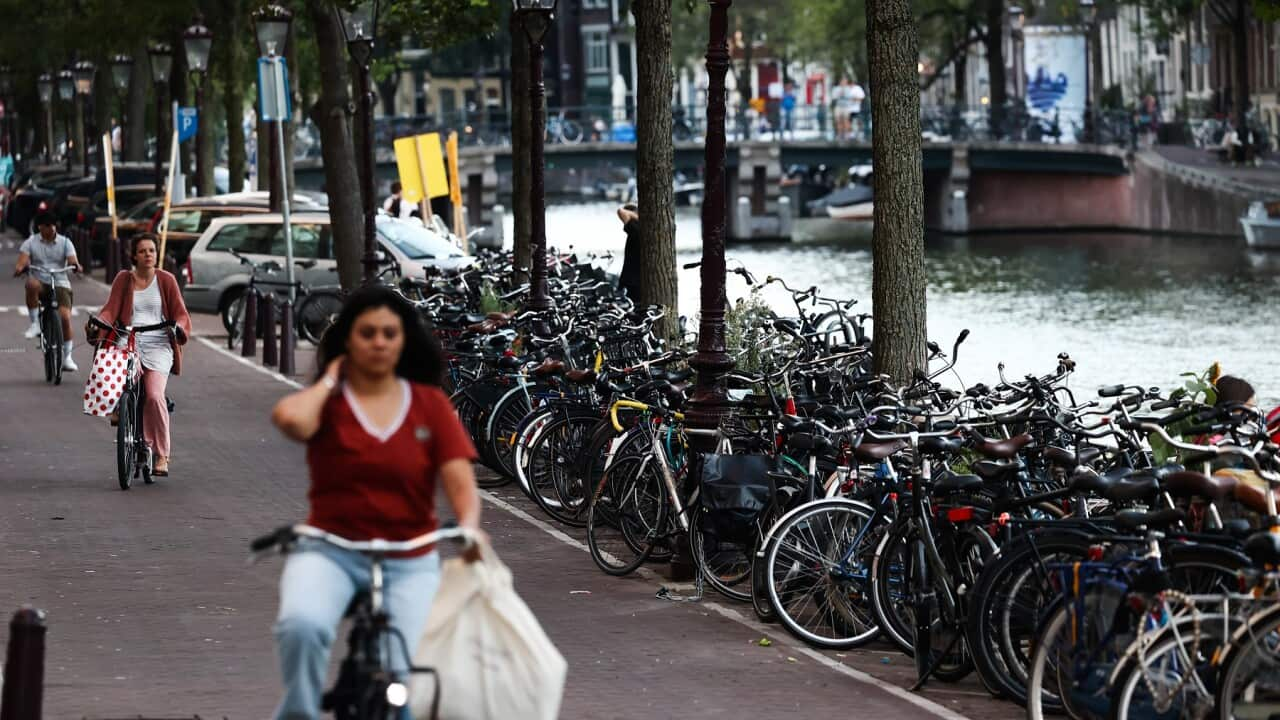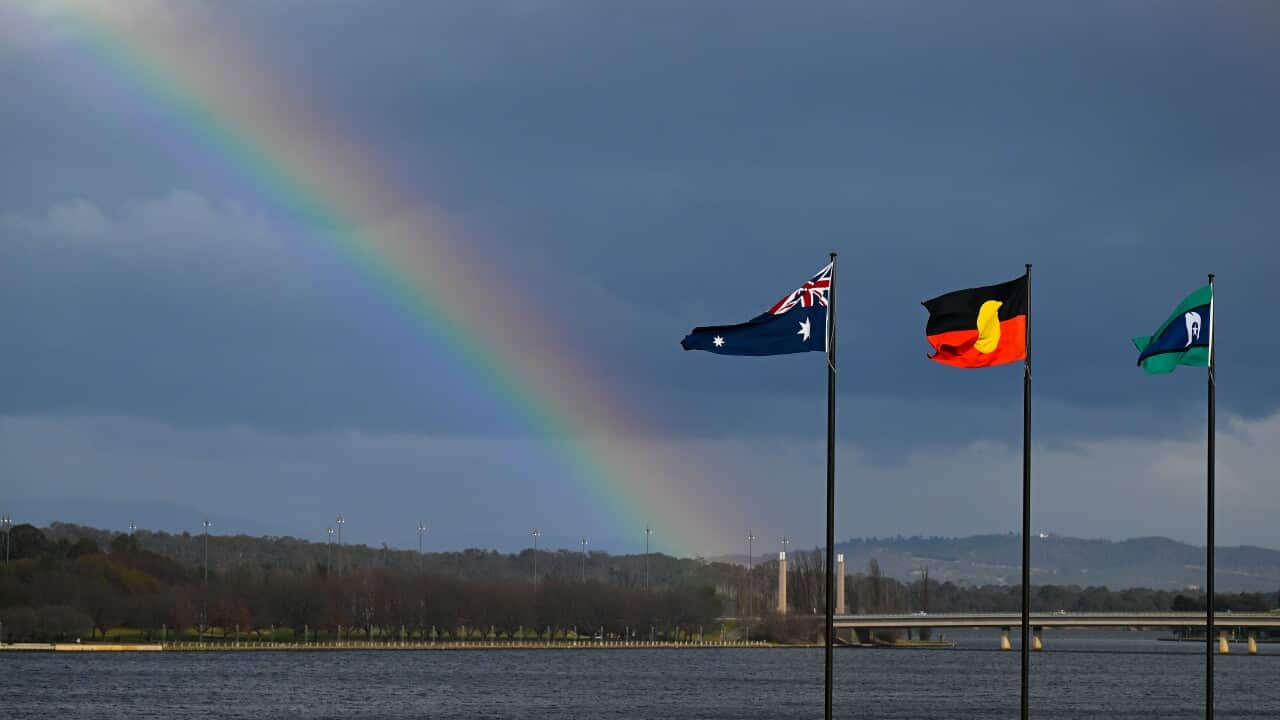TRANSCRIPT
Many places in Europe - like the Netherlands and Denmark - are renowned for their cycling culture.
Australia, not so much.
While improvements to infrastructure have been made over the years, like the introduction of bike lanes, concerns around safety remain.
But, according to experts, Australia's current state of play and level of infrastructure when it comes to embracing cycling isn't that far off from where the Netherlands used to be.
"Many people always think that the Netherlands is a cycling paradise and that it's part of the Dutch DNA. Sometimes people even joke like, 'Oh, the Dutch are born with a bicycle,' so to say. So, it's a really sort of cycling culture, but indeed it has not been always that way."
That's the former managing director of the Dutch Cycling Embassy Lucas Harms.
He says, in the 60s and 70s, huge protests took place when Dutch citizens realised large parts of their cities would be demolished to give way for cars and motorways.
"That led to an uprising, to mass demonstrations and what we call the 'Stop the Child Murder Movement' where people demonstrated because so many traffic fatalities were there, and so many people were being killed in traffic."
Since then, the Dutch have completely re-designed their streets to accommodate for more cycling.
"We really have been fighting for it, since this, the sixties and seventies. And yeah, we totally recreated and redesigned our streets since then, since the mid-eighties to accommodate for more cycling."
So, could embracing more of a cycling culture work in Australia, too?
Research from Monash University's Sustainable Mobility and Safety Research group found 78 per cent of Australians are interested in riding bicycles, but only 1.9 per cent of trips are actually made by bike.
It also found many hold back due to barriers like safety and connectivity - concerns shared by New South Wales Greens MP for Balmain Kobi Shetty.
"Well, we talk so much about getting our kids off screens. I think if we're worried about people opposing bike lanes here and opposing that kind of change, if we talk about the safety of kids, it's a really good way to start to shift the ideas around cycling to make sure that our kids are getting to school safely and then we can start to build on that culture."
June the 3rd marks World Bicycle Day.
It's prompting discussions around how Australia could potentially follow the lead of places like the Netherlands, and adopt similar changes.
The University of Sydney Business School's Professor Michiel Bliemer at the Institute of Transport and Logistics Studies explains.
"When I came here in Sydney more than 10 years ago, there were hardly any cycle ways. It was very unsafe. So, while I was riding my bicycle in the Netherlands, I did not ride my bicycle for a very long time in Sydney. But that has changed because now where I live, which is in the City of Sydney, there's quite a few cycle ways...The other one is connectivity. We need to have corridors where we can go from A to B. So just building one cycle away or one bike path in isolation in the suburb does not make any sense. That doesn't really help. So, it takes time to build up a network of bicycle paths."
New South Wales MP Kobi Shetty was among those who attended a screening of the film Together We Cycle, showcasing how the Netherlands got to where it is today in terms of embracing its cycling culture.
She says she'd like to see Australia follow its lead.
"It was just really nice to see where the Netherlands was back in the seventies because I feel like it's not that dissimilar to where we are in Australia now. And knowing that they can make decisions and change things over a relatively short period of time just makes me feel like we've got lots of opportunities to do the same here in Sydney."
Professor Michiel Bliemer says there are already plans underway, but they could take decades to establish.
"In Greater Sydney, there is a Strategic Cycle way Corridor Plan. So, they have made a plan with their vision that you should be able to cycle from the city to Penrith to Campbelltown, all on Cycleways. And it takes of course a long time to build it."
Balmain MP Kobi Shetty says it will also require some political will.
"It's a bit of a challenge. We know that the major parties have not been particularly good on getting people on bikes and not being particularly good on sort of climate action and active transport. There are people that really want to change things in parliament of all political stripes. So, I think it's just about having those conversations, getting people from the Netherlands to come and speak to my colleagues in New South Wales Parliament and hear about the changes that can be made relatively simply if there's just some will. So, it's about having those conversations and showing them how good it could really be."
Lucas Harms says aside from the health, social and environmental benefits, there's also a cost benefit to implementing bike lanes, too.
"There's always a lot of discussion and fuss, for instance, about shop owners in streets that they're afraid that their revenues will go down if you transformed the street into to give more space for cyclists. They think, 'oh, then people won't be able to come with a car, they won't be able to park, and the revenues of the shops will go down.' But it's actually the other way around. We've seen in many instances, in many cities around the world, also in the Netherlands, that the revenues of shop owners are going to increase because the street is much more attractive; there's more space for terraces, and people on their bikes are coming more often."
He also acknowledges not everyone has the same access and says there are specific bikes to accommodate for people with disabilities.
"They can for instance, use a three-wheeler or a four-wheeler bicycles in the Netherlands. There are specific bikes that accommodate their specific needs. And there's enough space also on the bike lanes in the Netherlands to accommodate for those very special bikes. And also good to mention is that due to the fact that there are so many people cycling in the Netherlands, the remaining space for, for cars is actually used very efficiently."
For the past five years, the Dutch Cycling Embassy's aim has been to bring knowledge and expertise from the Netherlands, to cities and countries around the world.
Lucas Harms says he hopes that can continue in Australia, too.
"So, we could bring experts to Sydney to work together with experts from Australia to get inspired in that sense from what the Dutch have learned on this bumpy road since the seventies themselves. It's also possible, for instance, that we've done it as a tracking embassy as well, to bring high level influencers or decision makers, for instance, from Australia to the Netherlands to let them experience the streets capes in the Netherlands themselves. To ride a bike and to see for themselves what it can potentially do to cities."













